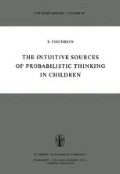Abstract
As we have already indicated, intuition is, according to our hypothesis, the means by which intelligence secures for cognition an immediate control over action. An intuition is a stabilised action programme* which is derived from experience, and which is effective because of its global, immediate, and flexible qualities.
Access this chapter
Tax calculation will be finalised at checkout
Purchases are for personal use only
Preview
Unable to display preview. Download preview PDF.
Note
The term ‘action programme’ recalls the ‘Plan’ of Miller, Galanter and Pribram (G. A. Miller, E. Galanter, and K. H. Pribram: Plans and the Structure of Behavior, Holt, Rinehart and Winston, 1967). These authors’ use of the term ‘Plan’ is, however, much wider. A Plan is any hierarchical process in the organism that can control the order in which a sequence of operations is performed (Miller et al., 1967, p. 16). Instincts, habits, and problem-solving procedures all presuppose Plans. Intuition, as we define it, therefore falls into this category of intervening variables. Yet, in addition, intuition presupposes a set of distinguishing features which confer specificity on it.
Rights and permissions
Copyright information
© 1975 D. Reidel Publishing Company, Dordrecht, Holland
About this chapter
Cite this chapter
Fischbein, E. (1975). Probability Learning. In: The Intuitive Sources of Probabilistic Thinking in Children. Synthese Library, vol 85. Springer, Dordrecht. https://doi.org/10.1007/978-94-010-1858-6_3
Download citation
DOI: https://doi.org/10.1007/978-94-010-1858-6_3
Publisher Name: Springer, Dordrecht
Print ISBN: 978-90-277-1190-8
Online ISBN: 978-94-010-1858-6
eBook Packages: Springer Book Archive

